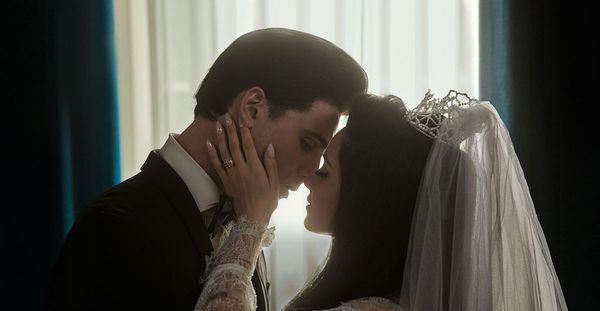
The first image in “Priscilla” has the title character (Cailee Spaeny) sinking her feet into deep shag carpet at Graceland. It is a metaphor for how she will be immersed into Elvis’ (Jacob Elordi) world; she is one of his many possessions. How this happens and how she escapes it are the two bookends of Sofia Coppola’s sympathetic character study.
The film opens in West Germany 1959, where Elvis is doing his army service and Priscilla’s family is stationed. When Priscilla is invited to meet Elvis, she needs to get her parents’ permission to go. The encounter brings her drab life into full color. Elvis is lonely and homesick like Priscilla, and they bond slowly over the course of several meetings — which becomes an issue for the 14-year-old’s parents.
Elvis may be shy, with his polite, hesitant way of speaking (he uses an intimate voice, as opposed to his big performance one), and he does come alive singing, “Whole Lotta Shakin’ Goin’ On” at a party. (That it is a Jerry Lee Lewis song is almost a wink at the creep factor; no Elvis songs are performed in the film, which is called “Priscilla” for a reason).
As the pair get chummy, they both fall in love. She has a secret smile on her face walking down the halls in high school, but there is a question of intent here. As “Priscilla” shows, Elvis is a gentleman, refusing to sleep with her. Priscilla is “mature for her age,” but her parents are still concerned. When Elvis arranges for Priscilla to visit him in Memphis after he is discharged, it cements their relationship. It also gives a hint of how limited her life with him will be. Elvis may just want a doll he can lock in a gilded cage (a theme of all of Coppola’s work). He also gives her drugs — to keep her awake, to help her sleep — ones he takes as well.

Their love is more shown that felt. She brings him breakfast in one scene; he gives her a gun. It is cute, perhaps, but Coppola’s detached perspective makes “Priscilla” uneven. The film is deliberately airless and suffocating, letting viewers feel how trapped Priscilla is in her situation. And despite outstanding period costumes, makeup and sets, it feels sterile. The film is full of textures, including Priscilla’s hair and clothes, which Elvis also controls. Even when he has outbursts of anger — in one scene, he throws a chair at her — it only reveals that Elvis can be abusive. His behavior is erratic, illustrating that Elvis is nice except when he is not.
It is not hard to see how Priscilla fell for the King who appeals to everyone. When he is rumored to be involved with Ann-Margaret, a costar on a film he is making, Priscilla, practically imprisoned in Graceland, gets jealous and angry. She tells him she needs to feel desired, but Elvis ignores her. He gave her a dog and then later, a child, but mostly he keeps her locked up as a doll in a dollhouse.
Spaeny captures Priscilla’s conflicted emotions and experiences well. She is convincing as both a dreamy teenager and a wise-beyond-her-years young woman. It is nice to see her mature over the course of the film which spans from 1959 to the 1972. (There is an amusing sequence in 1964 Los Angeles, where Elvis becomes involved in beatnik-like philosophy that Priscilla disdains.) But mostly Coppola shows her to be this lonely young woman who is caught in a world she thought she desired.
Elordi’s performance is equally magnetic, especially in scenes where Elvis is polite or seductive, as with Priscilla’s parents. But he also plays Elvis with a serious case of arrested development, wanting to spend time with his “boys.” He leaves Priscilla on her own for long stretches of time while he is off making movies and asks her to “keep the home fires burning.” Elordi’s take on Elvis is mostly low key, and he doesn’t try to emulate the King except vocally, which is appropriate. The actor’s height allows him to tower over Spaeny to such a degree that it only emphasizes her smallness next to his stature. Significantly, there is only one scene of Elvis performing, and it is him, seen from behind, in a show that Coppola shoots without music.
Coppola is very deliberate with what she shows here, and there are fantastic tracking shots as Elvis leaves Priscilla alone (again), or a nice sight gag of Priscilla coming out of her high school graduation and seeing Elvis posing for photos with one of the nuns, a gun in his pants.
“Priscilla” however, seems a bit superficial in presenting all these images without much behind them. Priscilla’s loneliness is felt, no doubt, but that is all there is. The film is almost like the whispers Priscilla hears from her classmates gossiping about her in school. Everyone thinks they know the story, but there is more to it. Coppola doesn’t tell that more, she lets audiences infer that through the elliptical narrative that highlights her subject’s loneliness and abuse. Priscilla’s experiences may be an interesting and important aspect of Elvis’ legacy, but this film makes it only moderately engaging.
“Priscilla” opens in theaters nationwide Nov. 3.







